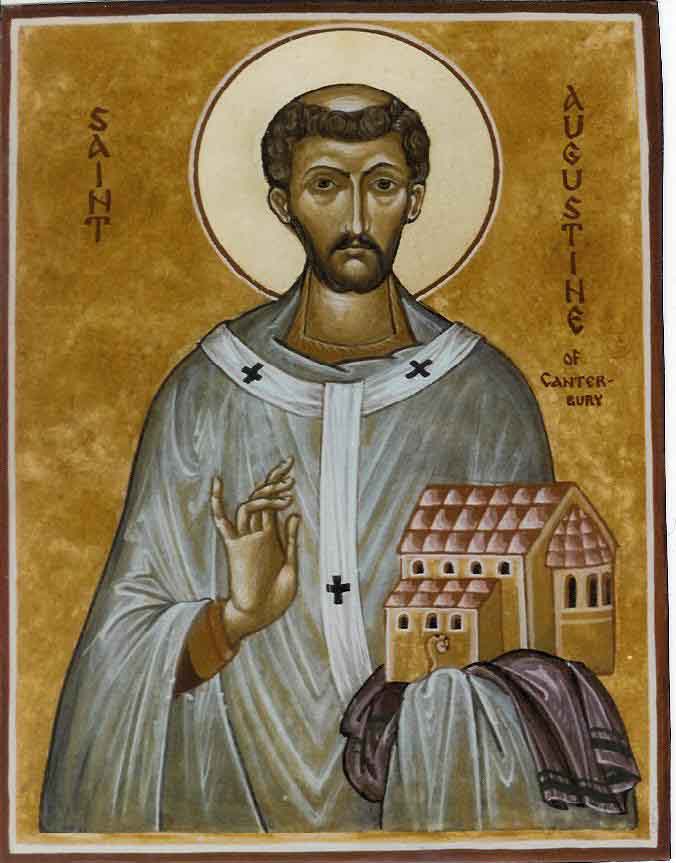

very daft


St. Augustine of Kent, the missionary who started the conversion of the Anglo-Saxons to Christianity

St. Augustine of Kent, the missionary who started the conversion of the Anglo-Saxons to Christianity
From Newadvent
The event which afforded Pope Gregory the opportunity he had so long desired of carrying out his great missionary plan in favour of the English happened in the year 595 or 596. A rumour had reached Rome that the pagan inhabitants of Britain were ready to embrace the Faith in great numbers, if only preachers could be found to instruct them.The pope was obliged to complain of the lack of episcopal zeal among Aethelberht Christian neighbours. Whether we are to understand the phrase ex vicinis (Greg., Epp., VI) as referring to Gaulish prelates or to the Celtic bishops of northern and western Britain, the fact remains that neither Bertha's piety, nor Luidhard's preaching, nor Aethelberht's toleration, nor the supposedly robust faith of British or Gaulish neighbouring peoples was found adequate to so obvious an opportunity until a Roman pontiff, distracted with the cares of a world supposed to be hastening to its eclipse, first exhorted forty Benedictines of Italian blood to the enterprise.
The promised interview between the king and the missionaries took place within a few days. It was held in the open air, sub divo, says Bede (Bede, H.E., I, xxv), on a level spot, probably under a spreading oak in deference to the king's dread of Augustine's possible incantations. His fear, however, was dispelled by the native grace of manner and the kindly personality of his chief guest who addressed him through an interpreter. The message told "how the compassionate Jesus had redeemed a world of sin by His own agony and opened the Kingdom of Heaven to all who would believe" (Aelfric, ap. Haddan and Stubbs, III, ii). The king's answer, while gracious in its friendliness, was curiously prophetic of the religious after-temper of his race. "Your words and promised are very fair" he is said to have replied, "but as they are new to us and of uncertain import, I cannot assent to them and give up what I have long held in common with the whole English nation. But since you have come as strangers from so great a distance, and, as I take it, are anxious to have us also share in what you conceive to be both excellent and true, we will not interfere with you, but receive you, rather, in kindly hospitality and take care to provide what may be necessary for your support. Moreover, we make no objection to your winning as many converts as you can to your creed". (Bede, H.E., I, xxv.)
The king more than made good his words. He invited the missionaries to take up their abode in the royal capital of Canterbury, then a barbarous and half-ruined metropolis, built by the Kentish folk upon the site of the old Roman military town of Durovernum. In spite of the squalid character of the city, the monks must have made an impressive picture as they drew near the abode "over against the King.' Street facing the north", a detail preserved in William Thorne's (c. 1397) "Chronicle of the Abbots of St. Augustine's Canterbury," p. 1759, assigned them for a dwelling. The striking circumstances of their approach seem to have lingered long in popular remembrance; for Bede, writing fully a century and a third after the event, is at pains to describe how they came in characteristic Roman fashion (more suo) bearing "the holy cross together with a picture of the Sovereign King, Our Lord Jesus Christ and chanting in unison this litany", as they advanced: "We beseech thee, O Lord, in the fulness of thy pity that Thine anger and Thy holy wrath be turned away from this city and from Thy holy house, because we have sinned: Alleluia!" It was an anthem out of one of the many "Rogation" litanies then beginning to be familiar in the churches of Gaul and possibly not unknown also at Rome. (Martène, "De antiquis Ecclesiae ritibus", 1764, III, 189; Bede, "H.E.", II, xx; Joanes Diac., "De Vita Gregorii", II, 17 in Migne, P.L., LXXXV; Duchesne's ed., "Liber Pontificalis", II, 12.)
And now they return. Time for the reconversion of the British Isles!
Exactly what is the point of your post??
The story is about the C of E converts in England. Are you geographically confused??

Tyburn – the site of London’s present-day Marble Arch – was a place of execution from the 12th century until 1783. During the religious persecutions of the 16th and 17th centuries, many of the gallow’s victims were Catholics.